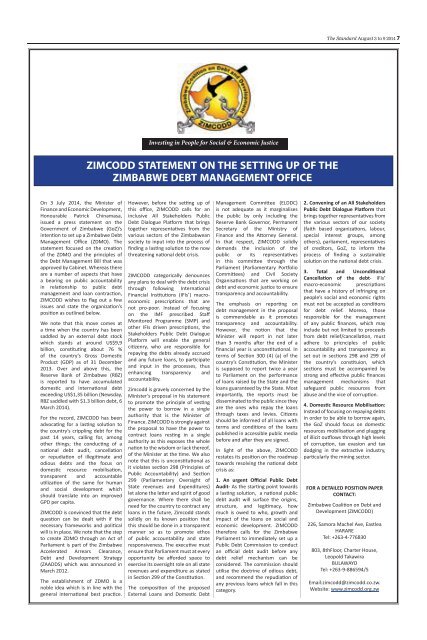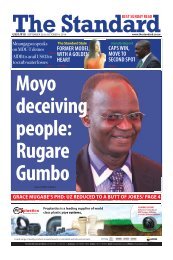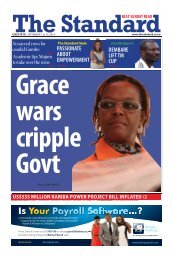You also want an ePaper? Increase the reach of your titles
YUMPU automatically turns print PDFs into web optimized ePapers that Google loves.
<strong>The</strong> <strong>Standard</strong> August 3 to 9 2014 7<br />
Investing in People for Social & Economic Justice<br />
ZIMCODD STATEMENT ON THE SETTING UP OF THE<br />
ZIMBABWE DEBT MANAGEMENT OFFICE<br />
On 3 July 2014, the Minister of<br />
Finance and Economic Development,<br />
Honourable Patrick Chinamasa,<br />
issued a press statement on the<br />
Government of Zimbabwe (GoZ)’s<br />
intention to set up a Zimbabwe Debt<br />
Management Office (ZDMO). <strong>The</strong><br />
statement focused on the creation<br />
of the ZDMO and the principles of<br />
the Debt Management Bill that was<br />
approved by Cabinet. Whereas there<br />
are a number of aspects that have<br />
a bearing on public accountability<br />
in relationship to public debt<br />
management and loan contraction,<br />
ZIMCODD wishes to flag out a few<br />
issues and state the organization’s<br />
position as outlined below.<br />
We note that this move comes at<br />
a time when the country has been<br />
saddled by an external debt stock<br />
which stands at around US$9,9<br />
billion, constituting about 76 %<br />
of the country’s Gross Domestic<br />
Product (GDP) as of 31 December<br />
2013. Over and above this, the<br />
Reserve Bank of Zimbabwe (RBZ)<br />
is reported to have accumulated<br />
domestic and international debt<br />
exceeding US$1,35 billion (Newsday,<br />
RBZ saddled with $1.3 billion debt, 6<br />
March 2014).<br />
For the record, ZIMCODD has been<br />
advocating for a lasting solution to<br />
the country’s crippling debt for the<br />
past 14 years, calling for, among<br />
other things; the conducting of a<br />
national debt audit, cancellation<br />
or repudiation of illegitimate and<br />
odious debts and the focus on<br />
domestic resource mobilisation,<br />
transparent and accountable<br />
utilization of the same for human<br />
and social development which<br />
should translate into an improved<br />
GPD per capita.<br />
ZIMCODD is convinced that the debt<br />
question can be dealt with if the<br />
necessary frameworks and political<br />
will is in place. We note that the step<br />
to create ZDMO through an Act of<br />
Parliament is part of the Zimbabwe<br />
Accelerated Arrears Clearance,<br />
Debt and Development Strategy<br />
(ZAADDS) which was announced in<br />
March 2012.<br />
<strong>The</strong> establishment of ZDMO is a<br />
noble idea which is in line with the<br />
general international best practice.<br />
However, before the setting up of<br />
this office, ZIMCODD calls for an<br />
inclusive All Stakeholders Public<br />
Debt Dialogue Platform that brings<br />
together representatives from the<br />
various sectors of the Zimbabwean<br />
society to input into the process of<br />
finding a lasting solution to the now<br />
threatening national debt crisis.<br />
ZIMCODD categorically denounces<br />
any plans to deal with the debt crisis<br />
through following International<br />
Financial Institutions (IFIs’) macroeconomic<br />
prescriptions that are<br />
not pro-poor. Instead of focusing<br />
on the IMF prescribed Staff<br />
Monitored Programme (SMP) and<br />
other IFIs driven prescriptions, the<br />
Stakeholders Public Debt Dialogue<br />
Platform will enable the general<br />
citizenry, who are responsible for<br />
repaying the debts already accrued<br />
and any future loans, to participate<br />
and input in the processes, thus<br />
enhancing transparency and<br />
accountability.<br />
Zimcodd is gravely concerned by the<br />
Minister’s proposal in his statement<br />
to promote the principle of vesting<br />
the power to borrow in a single<br />
authority that is the Minister of<br />
Finance. ZIMCODD is strongly against<br />
the proposal to have the power to<br />
contract loans resting in a single<br />
authority as this exposes the whole<br />
nation to the wisdom or lack thereof,<br />
of the Minister at the time. We also<br />
note that this is unconstitutional as<br />
it violates section 298 (Principles of<br />
Public Accountability) and Section<br />
299 (Parliamentary Oversight of<br />
State revenues and Expenditures)<br />
let alone the letter and spirit of good<br />
governance. Where there shall be<br />
need for the country to contract any<br />
loans in the future, Zimcodd stands<br />
solidly on its known position that<br />
this should be done in a transparent<br />
manner so as to promote ethos<br />
of public accountability and state<br />
responsiveness. <strong>The</strong> executive must<br />
ensure that Parliament must at every<br />
opportunity be afforded space to<br />
exercise its oversight role on all state<br />
revenues and expenditure as stated<br />
in Section 299 of the Constitution.<br />
<strong>The</strong> composition of the proposed<br />
External Loans and Domestic Debt<br />
Management Committee (ELDDC)<br />
is not adequate as it marginalises<br />
the public by only including the<br />
Reserve Bank Governor, Permanent<br />
Secretary of the Ministry of<br />
Finance and the Attorney General.<br />
In that respect, ZIMCODD solidly<br />
demands the inclusion of the<br />
public or its representatives<br />
in this committee through the<br />
Parliament (Parliamentary Portfolio<br />
Committees) and Civil Society<br />
Organisations that are working on<br />
debt and economic justice to ensure<br />
transparency and accountability.<br />
<strong>The</strong> emphasis on reporting on<br />
debt management in the proposal<br />
is commendable as it promotes<br />
transparency and accountability.<br />
However, the notion that the<br />
Minister will report in not later<br />
than 3 months after the end of a<br />
financial year is unconstitutional. In<br />
terms of Section 300 (4) (a) of the<br />
country’s Constitution, the Minister<br />
is supposed to report twice a year<br />
to Parliament on the performance<br />
of loans raised by the State and the<br />
loans guaranteed by the State. Most<br />
importantly, the reports must be<br />
disseminated to the public since they<br />
are the ones who repay the loans<br />
through taxes and levies. Citizens<br />
should be informed of all loans with<br />
terms and conditions of the loans<br />
published in accessible public media<br />
before and after they are signed.<br />
In light of the above, ZIMCODD<br />
restates its position on the roadmap<br />
towards resolving the national debt<br />
crisis as:<br />
1. An urgent Official Public Debt<br />
Audit- As the starting point towards<br />
a lasting solution, a national public<br />
debt audit will surface the origins,<br />
structure, and legitimacy, how<br />
much is owed to who, growth and<br />
impact of the loans on social and<br />
economic development. ZIMCODD<br />
therefore calls for the Zimbabwe<br />
Parliament to immediately set up a<br />
Public Debt Commission to conduct<br />
an official debt audit before any<br />
debt relief mechanism can be<br />
considered. <strong>The</strong> commission should<br />
utilise the doctrine of odious debt,<br />
and recommend the repudiation of<br />
any previous loans which fall in this<br />
category.<br />
2. Convening of an All Stakeholders<br />
Public Debt Dialogue Platform that<br />
brings together representatives from<br />
the various sectors of our society<br />
(faith based organizations, labour,<br />
special interest groups, among<br />
others), parliament, representatives<br />
of creditors, GoZ, to inform the<br />
process of finding a sustainable<br />
solution on the national debt crisis.<br />
3. Total and Unconditional<br />
Cancellation of the debt- IFIs’<br />
macro-economic prescriptions<br />
that have a history of infringing on<br />
people’s social and economic rights<br />
must not be accepted as conditions<br />
for debt relief. Moreso, those<br />
responsible for the management<br />
of any public finances, which may<br />
include but not limited to proceeds<br />
from debt relief/cancellation, must<br />
adhere to pricnciples of public<br />
accountability and transparency as<br />
set out in sections 298 and 299 of<br />
the country’s constituion, which<br />
sections must be accompanied by<br />
strong and effective public finances<br />
management mechanisms that<br />
safeguard public resources from<br />
abuse and the vice of corruption.<br />
4. Domestic Resource Mobilisation:<br />
Instead of focusing on repaying debts<br />
in order to be able to borrow again,<br />
the GoZ should focus on domestic<br />
resources mobilisation and plugging<br />
of illicit outflows through high levels<br />
of corruption, tax evasion and tax<br />
dodging in the extractive industry,<br />
particularly the mining sector.<br />
FOR A DETAILED POSITION PAPER<br />
CONTACT:<br />
Zimbabwe Coalition on Debt and<br />
Development (ZIMCODD)<br />
226, Samora Machel Ave, Eastlea<br />
HARARE<br />
Tel: +263-4-776830<br />
803, 8thFloor, Charter House,<br />
Leopold Takawira<br />
BULAWAYO<br />
Tel: +263-9-886594/5<br />
Email:zimcodd@zimcodd.co.zw.<br />
Website: www.zimcodd.org.zw


















